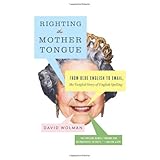
Average Reviews:

(More customer reviews)Are you looking to buy Righting the Mother Tongue: From Olde English to Email, the Tangled Story of English Spelling? Here is the right place to find the great deals. we can offer discounts of up to 90% on Righting the Mother Tongue: From Olde English to Email, the Tangled Story of English Spelling. Check out the link below:
>> Click Here to See Compare Prices and Get the Best Offers
Righting the Mother Tongue: From Olde English to Email, the Tangled Story of English Spelling ReviewHowever you spell it, this is good fun if you like linguistics, etymology and orthography. Starting with the basics of Wessex (West Saxon) Old English (there never was an 'e' on old until Victorian times) the language grew from the influx of Norman-French (from William the Conqueror), and all the languages of the Empire (pundit, serendipity, kiosk). But how did the spelling of the actual words come to be?Prior to the printed book, almost all books were hand scribed by monks in Scriptorium. (The building at Oxford where the OED was created was named so by sir James Murray.) Each monk spelled a word as close as he could to the way it sounded (phonetically). Since there were so few readers, it didn't really matter.
Once Guttenberg had devised his type-set printing, word spellings became much more important. The English (King James of 1611) translated Bible had different spellings for the same word, sometimes on the same page. As an aside, one of the reason we have odd spellings like 'ghost' instead of 'gost' was that the first English books were typeset in Bruges where the major language was Flemish. Typesetters made the decisions on the spot of how to spell a word (phonetically of course), and so used spellings they were comfortable with.
The first major shift to "standardize" English spellings, was by Dr. Samuel Johnson. Dr.Johnson's "Dictionary" was first published in 1755 and immediately became the "base line" (or war line) by which the budding science of 'philology' and 'lexicographers' (makers of dictionaries) fought the battle of the silent 'h' (in Ghost and Rhubarb) and silent 'gh' (in though and fought).
Noah Webster started the transatlantic lexicography war when he published his 'American Dictionary of the English Language' in 1828. Webster sought to 'americanize' English by changing gaol to jail, publick to public, centre to center and dropping the 'u' in honor, valor, color,etc.
This set off the longest running battle between the two major centers or centres of the English (?) speaking world.
In the late 1880's a group of men at Oxford, decided that the language needed to be standardized, because of the coming of government sanctioning of 'public' education. How to teach spelling and word meanings when there was no 'body' (such as the 'Academie Francais) to arbitrate the language. So the idea of the 'Oxford English Dictionary' was born. It took almost thirty years before it was completed in 1928 and it immediately became the standard for all publication in the UK and the British Empire. Americans are still making their own decisions.
With the advent of the internet and email, and especially cell phone 'texting', the language is once again developing a 'personalized' orthography. While there are accepted shorthand words such as Gr8 and BFF (best friends forever), there are a myriad of variations between friends and age groups. (No teenager wants to use the same shorthand as their parents, duh! how groudy!)
For those who enjoy a good story is how things came about (the eschatology) of any genre, this is a fun read (or reed or rede or ...
Zeb KantrowitzRighting the Mother Tongue: From Olde English to Email, the Tangled Story of English Spelling Overview
When did ghost acquire its silent h? Will cyberspace kill the one in rhubarb? And was it really rocket scientists who invented spell-check?
In Righting the Mother Tongue, author David Wolman tells the cockamamie story of English spelling, by way of a wordly adventure from English battlefields to Google headquarters. Along the way, he joins spelling reformers picketing the national spelling bee, visits the town in Belgium-not England-where the first English books were printed, and takes a road trip with the boss at Merriam-Webster Inc. Wolman punctuates the journey with spelling wars waged by the likes of Samuel Johnson, Noah Webster, Theodore Roosevelt, and Andrew Carnegie.
Rich with history, pop culture, curiosity, and humor, Righting the Mother Tongue explores how English spelling came to be, traces efforts to mend the code, and imagines the shape of tomorrow's words.
Want to learn more information about Righting the Mother Tongue: From Olde English to Email, the Tangled Story of English Spelling?
>> Click Here to See All Customer Reviews & Ratings Now
0 comments:
Post a Comment